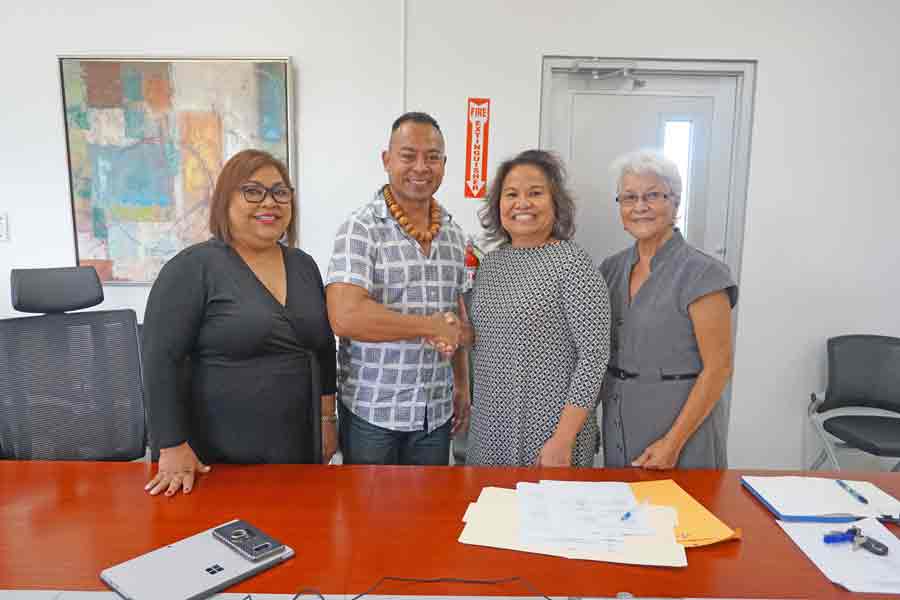PSS, NMTI ink accord to train future NMI workforce

From left, Board of Education vice chair Janice Tenorio, Northern Marianas Technical Institute board chair John Oliver Gonzalez, BOE chair Marylou S. Ada, and NMTI chief executive officer Agnes MsPhetres have their picture taken after the signing of a memorandum of agreement yesterday at the Board of Education conference room on Capital Hill. (Bea Cabrera)
A memorandum of agreement that aims to provide the “best education and opportunities” to graduating high school students was inked yesterday between the Public School System and the Northern Marianas Trade Institute.
John Oliver Gonzales, who chairs the NMTI board, described the moment as a milestone for both PSS and NMTI.
“Today’s signing with the CNMI State Board of Education demonstrates that NMTI is finally at a level where we are ready to accommodate their students, primarily in the high school category which is 9th grade up to senior,” said Gonzales. “Our next stage is to go down to the next level, junior high school, because we believe in starting them young in being efficient, effective, and responsible about their future.”
That begins with working on the whole cohorts of the program with the Public School System and teachers in the next few weeks.
“We already started with Kagman High School, Saipan Southern High School, and Marianas High School with auto mechanic, culinary arts, and construction crafts. Great things are ahead of us,” Gonales added.
NMTI chief executive officer Agnes McPhetres said the agreement is an authorization for PSS and NMTI to work together and set objectives for common goals.
“Our goal is to work with the curriculum department in the school system to see how we can have a seamless transition and identify changes that are needed in terms of graduation requirements for students who cannot go the academic route, which we will present to the [PSS] board.”
“This will actually lessen the [number of] drop outs,” McPhertres said.
Also, it won’t force those who do not want to pursue the academic route and lessen the number of students repeating grade levels, she added.
Also, it would be the best response for students that are looking at working immediately after high school.
“This agreement will open a real opportunity for students who want to learn skills, and who want to work immediately after high school. We will teach them to have the skills that will prepare them,” she said. “Our program is not only about preparing students, we are also put them in job trainings like internships.”
McPhetres boasted that NMTI graduates have a high rate of employment.
“Ninety-eight percent of those people that we placed in businesses are hired before they could even complete their internship. For those students that may not be able to have that opportunity to go to college, our doors are open,” she added.
McPhetres wants to eradicate the stigma associated with taking up a vocational course.
“The major problem that we are encountering right now is the idea that taking up a vocational course is for the ‘dummies.’ Our students have not realized the merit of what it is to have a skill. To be an electrician can mean that you don’t need to work for somebody because you can have your own business.”
“The certificates that we give our graduates are recognized in the U.S. mainland. In the event all these students pass the credentials and go to the mainland, they’ll be making salaries of $19, $20, or $26 an hour because of that skill. That’s how valuable skills are,” she added.
McPhetres said they are also looking at the apprenticeship component where the private sector will be a part of the educational process and curriculum because they offer good inputs such as what types of trainings are needed to help raise the economy.
“I also want our leaders and community to understand that we are not going to be training laborers. We are training students to be specialists. We don’t want our graduates to work for somebody to do hammering. We want our students to know about electrical and know about plumbing and carpentry,” she said.
“After the foreign workforce is finished with a project, we can send them back home and let our students or graduates take over by maintaining and refining it because they are the ones who are going to be here,” McPhetres added.
Gonzales said the signing of the MOA is timely because of the recent passage of Senate Bill 20-21. The bill recognizes the need to change NMTI’s status from being a private non-profit school into a public career and technical training institution.
“Senate Bill 20-21 was unanimously passed in the Senate, without any challenge or dissenting vote. It is now down to the House and we are hoping that the same sentiment and blessing we have from the Senate will be the same in the House,” he said.
“It’s a win-win situation for all the stakeholders—our leaders, private sector, corporate partners, and especially our students and residents—so we can truly authenticate and say we recognize the issue and, most importantly, we should seize the opportunities because only by working together can we achieve great things ahead of us,” he added.



























